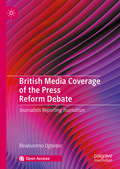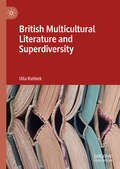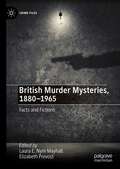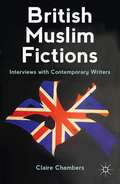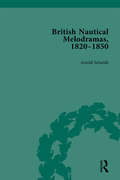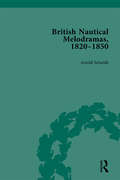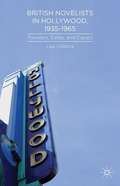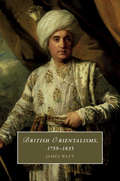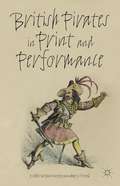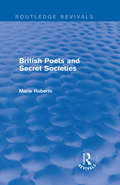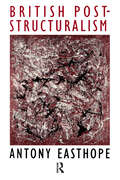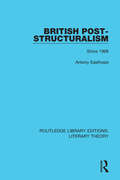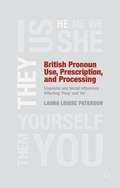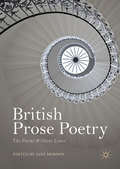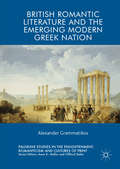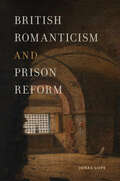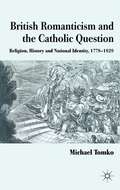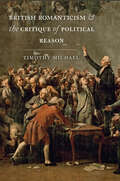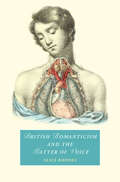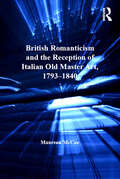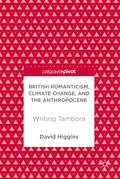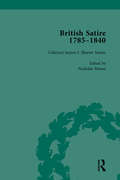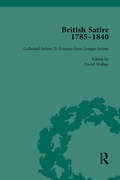- Table View
- List View
British Media Coverage of the Press Reform Debate: Journalists Reporting Journalism
by Binakuromo OgbeborThis open access book provides a detailed exploration of the British media coverage of the press reform debate that arose from the News of the World phone hacking scandal and the Leveson Inquiry. Gathering data from a content analysis of 870 news articles, Ogbebor shows how journalists cover debates on media policy and illustrates the impact of their coverage on democracy. Through this analysis, the book contributes to knowledge of paradigm repair strategies; public sphere; gatekeeping theory; the concept of journalism as an interpretive community; political economy of the press; as well as the neoliberal and social democratic interpretations of press freedom. Providing insight into factors inhibiting and aiding the role of the news media as a democratic public sphere, it will be a valuable resource for the press, media reform activists, members of the public, and academics in the fields of journalism, politics and law.
British Multicultural Literature and Superdiversity
by Ulla RahbekThis book explores contemporary British multicultural multi-genre literature. Considering socio-political and philosophical ideas about British multiculturalism, superdiversity and conviviality, Ulla Rahbek studies a broad range of texts by writers from across the majority-minority divide. The text focuses on figurative registers and metaphorical richness in multicultural poetry and investigates the interlocked issue of recognition, representation and identity in memoirs. Rahbek analyses how twenty-first-century British multicultural novels both envision and reimagine an inclusive nation and thematise the detrimental effects of individual exclusion on characters’ pursuits of the good life. She observes the ways that short stories pivot on ambivalent encounters and intercultural dialogue, and she reflects on the public good of multicultural literature.
British Murder Mysteries, 1880-1965: Facts and Fictions (Crime Files)
by Laura E. Nym Mayhall Elizabeth PrevostBritish Murder Mysteries, 1880-1965: Facts and Fictions conceptualizes detective fiction as an archive, i.e., a trove of documents and sources to be used for historical interpretation. By framing the genre as a shifting set of values, definitions, and practices, the book historicizes the contested meanings of analytical categories like class, race, gender, nation, and empire that have been applied to the forms and functions of detection. Three organizing themes structure this investigation: fictive facticity, genre fluidity, and conservative modernity. This volume thus shows how British detective fiction from the late-nineteenth to the mid-twentieth century both shaped and was shaped by its social, cultural, and political contexts and the lived experience of its authors and readers at critical moments in time.
British Muslim Fictions
by Claire ChambersThrough interviews with leading writers (including Ahdaf Soueif and Hanif Kureishi), this book analyzes the writing and opinions of novelists of Muslim heritage based in the UK. Discussion centres on writers' work, literary techniques, and influences, and on their views of such issues as the hijab, the war on terror and the Rushdie Affair.
British Nautical Melodramas, 1820–1850: Volume I
by Arnold SchmidtDuring the 1820s and 30s nautical melodramas "reigned supreme" on London stages, entertaining the mariners and maritime workers who comprised a large part of the audience for small theatres with the same sentimental moments and comic interludes of domestic melodrama mixed with patriotic images that communicated and reinforced imperial themes. However, generally the study of British theatre history moves from medieval and renaissance plays directly to the realism and naturalism of late Victorian and modern drama. Readers typically encounter a gap between Restoration and eighteenth-century plays like those of Oliver Goldsmith and Richard Brinsley Sheridan, and late-nineteenth plays by Henrik Ibsen and Oscar Wilde. Nineteenth-century drama, with the possible exception of plays by Byron, Shelley, and Wordsworth, remains all but invisible. Until recently, melodramatic plays written and performed during this "gap" received little scholarly attention, but their value as reflections of Britain’s promulgation of imperial ideology — and its role in constructing and maintaining class, gender, and racial identities — have given discussions of melodrama force and momentum. The plays in included in these three volumes have never appeared in a critical anthology and most have not been republished since their original nineteenth-century editions. Each play is transcribed from the original documents and includes an author biography, a headnote about the play itself, full annotations with brief definitions of unfamiliar vocabulary, and explanatory notes. Comprehensive editorial apparatus details the nineteenth-century imperial, naval, political, and social history relevant to the plays’ nautical themes, as well as discussing nineteenth-century theatre history, melodrama generally, and the nautical melodrama in particular. Contemporary theatre practices — acting, audiences, staging, lighting, special effects — are also examined. An extensive bibliography of primary and secondary texts; a complete index; and contemporary images of the actors, theatres, stage sets, playbills, costumes, and locales have been compiled to aid study further. The appendices include maps of Britain, Europe, and the East and West Indies.
British Nautical Melodramas, 1820–1850: Volume II
by Arnold SchmidtDuring the 1820s and 30s nautical melodramas "reigned supreme" on London stages, entertaining the mariners and maritime workers who comprised a large part of the audience for small theatres with the same sentimental moments and comic interludes of domestic melodrama mixed with patriotic images that communicated and reinforced imperial themes. However, generally the study of British theatre history moves from medieval and renaissance plays directly to the realism and naturalism of late Victorian and modern drama. Readers typically encounter a gap between Restoration and eighteenth-century plays like those of Oliver Goldsmith and Richard Brinsley Sheridan, and late-nineteenth plays by Henrik Ibsen and Oscar Wilde. Nineteenth-century drama, with the possible exception of plays by Byron, Shelley, and Wordsworth, remains all but invisible. Until recently, melodramatic plays written and performed during this "gap" received little scholarly attention, but their value as reflections of Britain’s promulgation of imperial ideology — and its role in constructing and maintaining class, gender, and racial identities — have given discussions of melodrama force and momentum. The plays in included in these three volumes have never appeared in a critical anthology and most have not been republished since their original nineteenth-century editions. Each play is transcribed from the original documents and includes an author biography, a headnote about the play itself, full annotations with brief definitions of unfamiliar vocabulary, and explanatory notes. Comprehensive editorial apparatus details the nineteenth-century imperial, naval, political, and social history relevant to the plays’ nautical themes, as well as discussing nineteenth-century theatre history, melodrama generally, and the nautical melodrama in particular. Contemporary theatre practices — acting, audiences, staging, lighting, special effects — are also examined. An extensive bibliography of primary and secondary texts; a complete index; and contemporary images of the actors, theatres, stage sets, playbills, costumes, and locales have been compiled to aid study further. The appendices include maps of Britain, Europe, and the East and West Indies.
British Nautical Melodramas, 1820–1850: Volume III
by Arnold SchmidtDuring the 1820s and 30s nautical melodramas "reigned supreme" on London stages, entertaining the mariners and maritime workers who comprised a large part of the audience for small theatres with the same sentimental moments and comic interludes of domestic melodrama mixed with patriotic images that communicated and reinforced imperial themes. However, generally the study of British theatre history moves from medieval and renaissance plays directly to the realism and naturalism of late Victorian and modern drama. Readers typically encounter a gap between Restoration and eighteenth-century plays like those of Oliver Goldsmith and Richard Brinsley Sheridan, and late-nineteenth plays by Henrik Ibsen and Oscar Wilde. Nineteenth-century drama, with the possible exception of plays by Byron, Shelley, and Wordsworth, remains all but invisible. Until recently, melodramatic plays written and performed during this "gap" received little scholarly attention, but their value as reflections of Britain’s promulgation of imperial ideology — and its role in constructing and maintaining class, gender, and racial identities — have given discussions of melodrama force and momentum. The plays in included in these three volumes have never appeared in a critical anthology and most have not been republished since their original nineteenth-century editions. Each play is transcribed from the original documents and includes an author biography, a headnote about the play itself, full annotations with brief definitions of unfamiliar vocabulary, and explanatory notes. Comprehensive editorial apparatus details the nineteenth-century imperial, naval, political, and social history relevant to the plays’ nautical themes, as well as discussing nineteenth-century theatre history, melodrama generally, and the nautical melodrama in particular. Contemporary theatre practices — acting, audiences, staging, lighting, special effects — are also examined. An extensive bibliography of primary and secondary texts; a complete index; and contemporary images of the actors, theatres, stage sets, playbills, costumes, and locales have been compiled to aid study further. The appendices include maps of Britain, Europe, and the East and West Indies.
British Novelists in Hollywood, 1935-1965: Travelers, Exiles, and Expats
by Lisa CollettaBritish Novelists in Hollywood, 1935-1965 calls attention to the shifting grounds of cultural expression by highlighting Hollywood as a site that unsettled definitions and narratives of colonialism and national identity for prominent British novelists such as Christopher Isherwood, P. G. Wodehouse, Evelyn Waugh, and J. B. Priestley.
British Orientalisms, 1759–1835 (Cambridge Studies in Romanticism #126)
by James WattHow did Britons understand their relationship with the East in the late eighteenth and early nineteenth centuries? James Watt's new study remaps the literary history of British Orientalisms between 1759, the 'year of victories' in the Seven Years' War, and 1835, when T. B. Macaulay published his polemical 'Minute on Indian Education'. It explores the impact of the war on Britons' cultural horizons, and the different and shifting ways in which Britons conceived of themselves and their nation as 'open' to the East across this period. Considering the emergence of new forms and styles of writing in the context of an age of empire and revolution, Watt examines how the familiar 'Eastern' fictions of the past were adapted, reworked, and reacted against. In doing so he illuminates the larger cultural conflict which animated a nation debating with itself about its place in the world and relation to its others.
British Pirates in Print and Performance
by Frederick BurwickFictional or real, pirates haunted the imagination of the 18th and 19th century-British public during this great period of maritime commerce, exploration, and naval conflict. British Pirates in Print and Performanc e explores representations of pirates through dozens of stage performances, including adaptations by Byron, Scott, and Cooper.
British Poets and Secret Societies (Routledge Revivals)
by Marie Mulvey-RobertsA surprisingly large number of English poets have either belonged to a secret society, or been strongly influenced by its tenets. One of the best known examples is Christopher Smart’s membership of the Freemasons, and the resulting influence of Masonic doctrines on A Song to David. However, many other poets have belonged to, or been influenced by not only the Freemasons, but the Rosicrucians, Gormogons and Hell-Fire Clubs. First published in 1986, this study concentrates on five major examples: Smart, Burns, William Blake, William Butler Yeats and Rudyard Kipling, as well as a number of other poets. Marie Roberts questions why so many poets have been powerfully attracted to the secret societies, and considers the effectiveness of poetry as a medium for conveying secret emblems and ritual. She shows how some poets believed that poetry would prove a hidden symbolic language in which to reveal great truths. The beliefs of these poets are as diverse as their practice, and this book sheds fascinating light on several major writers.
British Political Culture and the Idea of 'Public Opinion', 1867-1914
by James ThompsonNewspapers, periodicals, pamphlets and books all reflect the ubiquity of 'public opinion' in political discourse in late nineteenth and early twentieth-century Britain. Through close attention to debates across the political spectrum, James Thompson charts the ways in which Britons sought to locate 'public opinion' in an era prior to polling. He shows that 'public opinion' was the principal term through which the link between the social and the political was interrogated, charted and contested and charts how the widespread conviction that the public was growing in power raised significant issues about the kind of polity emerging in Britain. He also examines how the early Labour party negotiated the language of 'public opinion' and sought to articulate Labour interests in relation to those of the public. In so doing he sheds important new light on the character of Britain's liberal political culture and on Labour's place in and relationship to that culture.
British Post Structuralism
by Antony EasthopeFirst published in 1988. Through this exploration of the relation between Marxism, post-structuralism and the theory of the subject, first published in 1988, Antony Easthope contrasts the degree to which post-structuralism has made a radical impact on English and American national cultures.
British Post-Structuralism: Since 1968 (Routledge Library Editions: Literary Theory Ser. #7)
by Antony EasthopeThrough this exploration of the relation between Marxism, post-structuralism and the theory of the subject, first published in 1988, Antony Easthope contrasts the degree to which post-structuralism has made a radical impact on English and American national cultures. This book reprints an important interview in which Jacques Derrida discusses the
British Pronoun Use, Prescription, and Processing
by Laura Louise PatersonThis study considers the use of they and he for generic reference in post-2000 written British English. The analysis is framed by a consideration of language-internal factors, such as syntactic agreement, and language-external factors, which include traditional grammatical prescriptivism and the language reforms resulting from second-wave feminism.
British Prose Poetry: The Poems Without Lines
by Jane MonsonThis book is the first collection of essays on the British prose poem. With essays by leading academics, critics and practitioners, the book traces the British prose poem’s unsettled history and reception in the UK as well as its recent popularity. The essays cover the nineteenth, twentieth and twenty-first centuries exploring why this form is particularly suited to the modern age and yet can still be problematic for publishers, booksellers and scholars. Refreshing perspectives are given on the Romantics, Modernists and Post-Modernists, among them Woolf, Beckett and Eliot as well as more recent poets like Seamus Heaney, Geoffrey Hill, Claudia Rankine, Jeremy Over and Vahni Capildeo. British Prose Poetry moves from a contextual overview of the genre’s early volatile and fluctuating status, through to crucial examples of prose poetry written by established Modernist, surrealist and contemporary writers. Key questions around boundaries are discussed more generally in terms of race, class and gender. The British prose poem’s international heritage, influences and influence are explored throughout as an intrinsic part of its current renaissance.
British Romantic Literature and the Emerging Modern Greek Nation (Palgrave Studies In The Enlightenment, Romanticism And Cultures Of Print Ser.)
by Alexander GrammatikosBritish Romantic Literature and the Emerging Modern Greek Nation makes an original contribution to the field of British Romantic Hellenism (and Romanticism more broadly) by emphasizing the diversity of Romantic-era writers’ attitudes towards, and portrayals of, Modern Greece. Whereas, traditionally, studies of British Romantic Hellenism have predominantly focused on Europe’s preoccupation with an idealized Ancient Greece, this study emphasizes the nuanced and complex nature of British Romantic writers’ engagements with Modern Greece. Specifically, the book emphasizes the ways that early nineteenth-century British literature about contemporary Greece helped to strengthen British-Greek intercultural relations and, ultimately, to situate Greece within a European sphere of influence.
British Romanticism and Prison Reform (Transits: Literature, Thought & Culture, 1650-1850)
by Jonas CopeIn eighteenth-century Britain, criminals were routinely whipped, branded, hanged, or transported to America. Only in the last quarter of the century—with the War of American Independence and legal and sociopolitical challenges to capital punishment—did the criminal justice system change, resulting in the reformed prison, or penitentiary, meant to educate, rehabilitate, and spiritualize even hardened felons. This volume is the first to explore the relationship between historical penal reform and Romantic-era literary texts by luminaries such as Godwin, Keats, Byron, and Austen. The works examined here treat incarceration as ambiguous: prison walls oppress and reinforce the arbitrary power of legal structures but can also heighten meditation, intensify the imagination, and awaken the conscience. Jonas Cope skillfully traces the important ideological work these texts attempt: to reconcile a culture devoted to freedom with the birth of the modern prison system that presents punishment as a form of rehabilitation. Published by Bucknell University Press. Distributed worldwide by Rutgers University Press.
British Romanticism and the Catholic Question
by Michael TomkoThe debate over extending full civil rights to British and Irish Catholics not only preoccupied British politics but also informed the romantic period's most prominent literary works. This book offers the first comprehensive, interdisciplinary study of Catholic Emancipation, one of the romantic period's most contentious issues.
British Romanticism and the Critique of Political Reason
by Timothy MichaelRomantic writers responded to the challenges of reform and revolution by rethinking the scope of political reason.What role should reason play in the creation of a free and just society? Can we claim to know anything in a field as complex as politics? And how can the cause of political rationalism be advanced when it is seen as having blood on its hands? These are the questions that occupied a group of British poets, philosophers, and polemicists in the years following the French Revolution.Timothy Michael argues that much literature of the period is a trial, or a critique, of reason in its political capacities and a test of the kinds of knowledge available to it. For Wordsworth, Coleridge, Shelley, Burke, Wollstonecraft, and Godwin, the historical sequence of revolution, counter-revolution, and terror in France—and radicalism and repression in Britain—occasioned a dramatic reassessment of how best to advance the project of enlightenment. The political thought of these figures must be understood, Michael contends, in the context of their philosophical thought. Major poems of the period, including The Prelude, The Excursion, and Prometheus Unbound, are in this reading an adjudication of competing political and epistemological claims. This book bridges for the first time two traditional pillars of Romantic studies: the period’s politics and its theories of the mind and knowledge. Combining literary and intellectual history, it provides an account of British Romanticism in which high rhetoric, political prose, poetry, and poetics converge in a discourse of enlightenment and emancipation.
British Romanticism and the Matter of Voice (Cambridge Studies in Romanticism)
by Alice RhodesPhysiological, political, and poetic studies of the relationship between the human body and voice saw increased attention and took on new significance in British literature of the politically turbulent period between the 1770s and the 1820s. Focusing on Erasmus Darwin, John Thelwall, and Percy Bysshe Shelley, three writers whose works draw together the fields of science, politics, language, and literature, and who were subject to charges of political radicalism and materialist philosophy, Alice Rhodes draws attention to a developing theory of spoken and poetic utterance which, for its subscribers, suggested a fundamental, material, and reciprocal connection between the speaking body and the physical, social, and political worlds around it. By investigating the Romantic-era fascination with the mechanics and physiology of speech production, she explores how Darwin, Thelwall, and Shelley came to present the voice as a form of physical, autonomous, and effective political action.
British Romanticism and the Reception of Italian Old Master Art, 1793-1840 (Studies in Art Historiography)
by Maureen McCueAs a result of Napoleon’s campaigns in Italy, Old Master art flooded into Britain and its acquisition became an index of national prestige. Maureen McCue argues that their responses to these works informed the writing of Romantic period authors, enabling them to forge often surprising connections between Italian art, the imagination and the period’s political, social and commercial realities. Dr McCue examines poetry, plays, novels, travel writing, exhibition catalogues, early guidebooks and private experiences recorded in letters and diaries by canonical and noncanonical authors, including Felicia Hemans, William Buchanan, Henry Sass, Pierce Egan, William Hazlitt, Percy Shelley, Lord Byron, Anna Jameson, Maria Graham Callcott and Samuel Rogers. Her exploration of the idea of connoisseurship shows the ways in which a knowledge of Italian art became a key marker of cultural standing that was no longer limited to artists and aristocrats, while her chapter on the literary production of post-Waterloo Britain traces the development of a critical vocabulary equally applicable to the visual arts and literature. In offering cultural, historical and literary readings of the responses to Italian art by early nineteenth-century writers, Dr McCue illuminates the important role they played in shaping the themes that are central to our understanding of Romanticism.
British Romanticism, Climate Change, and the Anthropocene: Writing Tambora
by David HigginsThis book is the first major ecocritical study of the relationship between British Romanticism and climate change. It analyses a wide range of texts - by authors including Lord Byron, William Cobbett, Sir Stamford Raffles, Mary Shelley, and Percy Shelley - in relation to the global crisis produced by the eruption of Mount Tambora in 1815. By connecting these texts to current debates in the environmental humanities, it reveals the value of a historicized approach to the Anthropocene. British Romanticism, Climate Change, and the Anthropocene examines how Romantic texts affirm the human capacity to shape and make sense of a world with which we are profoundly entangled and at the same time represent our humiliation by powerful elemental forces that we do not fully comprehend. It will appeal not only to scholars of British Romanticism, but to anyone interested in the relationship between culture and climate change.
British Satire, 1785-1840, Volume 1
by John Strachan Steven E JonesThis set offers a representitive collection of the verse satire of the Romantic period, published between the mid-1780s and the mid-1830s. As well as two single-author volumes, from William Gifford and Thomas Moore, there is also a wealth of rare, unedited material.
British Satire, 1785-1840, Volume 2
by John Strachan Steven E JonesThis set offers a representitive collection of the verse satire of the Romantic period, published between the mid-1780s and the mid-1830s. As well as two single-author volumes, from William Gifford and Thomas Moore, there is also a wealth of rare, unedited material.
